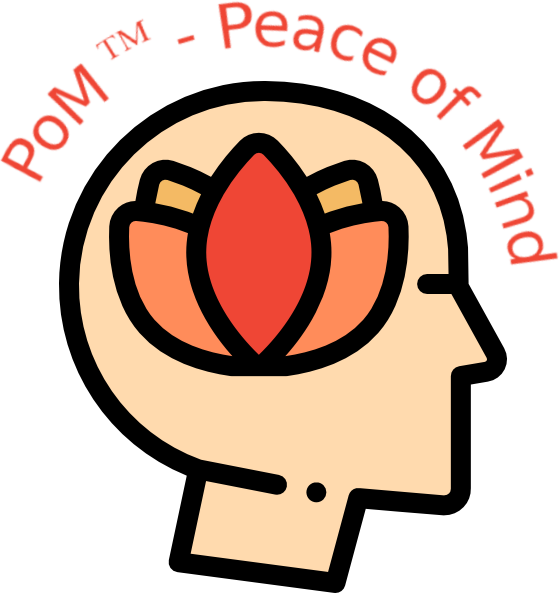Why PoM matters ? - The founder's Manifesto on the World Mental Health Day 2024 (10th Oct)
Togetherness in Mindfulness: A Manifesto for Healing & Growth

PoM - Peace of Mind™ ... Happy Life! is the brain child of its founder Cpt. JayR in 2023 from a deeply personal understanding of the long-lasting effects of global conflicts. The emotional scars of war, past and present, increasing damages of our planet and the negative environmental impact of human race ripple through generations, leaving many mentally and emotionally wounded.
PoM - Peace of Mind™ ... Happy Life! exists to address this suffering, offering pathways to healing and mental clarity in a world often consumed by fear and unrest.

The mission of PoM - Peace of Mind™ is simple yet profound: to bring awareness, (self) healing, and mindfulness to the individuals and communities that are affected by this global suffering.
PoM - Peace of Mind™ aims to awaken a collective sense of peace—by addressing the inner emotional turmoil that each of us carries, often without knowing it. It offers a pathway to healing and emotional freedom—the type of healing that cannot be bought with wealth, status, or material success.
Instead, it is a form of healing rooted in self-awareness, compassion, and interconnectedness. In a (virtual) world where chaos is broadcast live through newsfeeds, where wars and suffering are displayed in real-time,
The Scope of the problem of global dimension.
Urgency of global dimension
Solutions in practise.
- PoM offers a sanctuary of peace, a reminder that amidst all the madness, we can find stillness and clarity.
- PoM is a response to the collective trauma that so many people are facing right now and the personal struggles you’ve overcome in your own life, a reminder that true peace can only be achieved when we reconnect with ourselves and one another.
- PoM is more than a brand. It is an invitation—a call to center ourselves in a world that constantly pulls us outward into fear, distraction, and materialism.
- PoM exists to help you find clarity amidst chaos.
- PoM exists to remind you that in every moment of suffering, there is an opportunity for transformation.
- PoM is not just a brand, but a movement—a call to turn words into change, fostering a global mental health revolution.

Individual & Collective
Through mindfulness, through (self) awareness, through inner peace, we can begin to heal not only ourselves but the world around us.
As addressed, mental health problems are a serious concern, but they're not insurmountable. - By working together, we can defuse this ticking bomb and create a future where everyone has the support they need to thrive mentally.
Both on individual and collective level, we can work towards a world where everyone has access to the mental health support they need to thrive.
... on Individual Level:
-
Self-Care and Awareness:
- Prioritize Mental Health: Make self-care a daily routine, including activities like exercise, meditation, and hobbies.
- Educate Yourself: Learn about mental health conditions and how to recognize symptoms in yourself and others.
-
Challenge Stigma: Speak openly about mental health to reduce stigma and encourage others to seek help.
-
Healthy Lifestyle:
- Balanced Diet: Nourish your body with a healthy diet to support mental well-being.
- Adequate Sleep: Aim for 7-9 hours of quality sleep each night.
-
Limit Substance Use: Excessive alcohol or drug use can exacerbate mental health problems.
-
Build a Support Network:
- Connect with Others: Spend time with loved ones, join social groups, or seek out online communities.
- Find a Mentor: Having a trusted person to talk to can provide guidance and support.

... on Non-Governmental Level:
-
Advocacy and Awareness Campaigns:
- Raise Awareness: Organize events, workshops, and social media campaigns to educate the public about mental health.
-
Lobby for Policy Changes: Advocate for increased funding for mental health services and policies that support mental well-being.
-
Community-Based Initiatives:
- Support Groups: Create or join support groups for individuals with mental health conditions.
- Mental Health Training: Provide training to community members on mental health first aid and crisis intervention.
-
Collaborate with Local Organizations: Partner with schools, businesses, and healthcare providers to promote mental health.
-
Technology and Innovation:
- Leverage Digital Platforms: Use technology to provide accessible mental health resources and support.
- Research and Development: Invest in research to develop new treatments and interventions for mental health conditions.
... with Collective Action through the UN and Its Affiliates:
- Global Mental Health Strategy: Develop a comprehensive global strategy that outlines goals, priorities, and actions for addressing mental health issues.
- Increased Funding: Allocate adequate funding to mental health programs and initiatives.
- Data Collection and Research: Conduct research to better understand mental health trends and inform policy decisions.
- Capacity Building: Support countries in developing their mental health systems and workforce.
- Collaboration with Other Sectors: Work with organizations in education, labor, and social development to address the social determinants of mental health.




